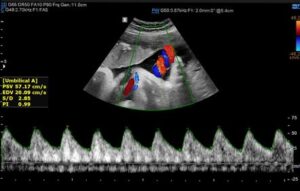In the field of medical imaging, Doppler studies are used to evaluate the blood flow. This medical technique uses the Doppler Effect to evaluate the blood flow in organs & vessels. It also helps to detect abnormalities in various body parts, especially in cardiovascular system. Healthcare professionals use this procedure to assess the direction, speed and volume of blood flow in vessels and organs.
Doppler studies are performed for various purposes like, cardiology, vascular surgery, obstetrics, and gynecology etc. They can diagnose deep vein thrombosis, arterial stenosis, peripheral artery disease, and monitor the health of fetusduring pregnancy etc.
Doppler studies are performed by only trained healthcare professionals(Radiologist). Then, these results are interpreted by medical experts and physicians.
Understanding the Doppler Effect:
Doppler Effect describes the variation in frequency of waves due to relative motion between source and observer. The sound waves are produced by transducer and interact with blood cells, their frequency changes depending on the velocity and blood flow direction. The experts gain valuable information from this frequency shift in real-time.
The Role of Doppler Studies in Pregnancy
Women go through many physical and mental changes during pregnancy. During this period, it is very important to make sure that both the mother and the growing baby are healthy. Doppler technology and other medical advances have revolutionized the prenatal care. These studies have made it easier for doctors to observe the progress of a pregnancy more closely and detect any abnormality.
Umbilical Artery Doppler (UA Doppler)
During pregnancy, a number of Doppler studies can be performed to ensure the health of the baby in the womb like Umbilical Artery Doppler, Middle Cerebral Artery Doppler (MCA), Uterine Artery Doppler and Ductus Venosus Doppler etc. The most common Doppler is Umbilical Artery Doppler, which measures the flow of blood in Umbilical Artery that is responsible for the supply of oxygenated blood from placenta to the fetus. Mainly this Doppler is performed in 3rd trimester (last three months of pregnancy) but in high risk patients, it can also be done earlier (in 2nd trimester) on the recommendations of gynecologist.
What is Umbilical Cord?
The umbilical cord connects the baby to mother placenta and it has three vessels (one vein and two arteries). During development stages of fetus, the umbilical cord supply nutrients and is the lifeline for the baby. After the birth, cord is cut which eventually dries out in 1-3 weeks leaving behind belly button.
Few important and common Indications for Umbilical Artery Doppler
There are certain medical conditions when Umbilical Doppler is suggested. These may include
- Fetal growth is lagging behind due to fetal growth restriction(IUGR).
- Twin-twin transfusion
- Mother health conditions like diabetes mellitus, kidney diseases, hypertension, and abnormality in coagulation system etc.
- Pregnancy related conditions like decreased fetal movement, decreased or increased amniotic fluid (AFI) etc.
- In previous pregnancy, there is history of IUGR, eclampsia and previous intrauterine death of fetus etc.
Doppler study as key investigation for the management of pregnancy outcome
Doppler ultrasound gives healthcare professionals important information that helps them to take care of pregnancies and make proper decisions. Doppler helps doctors to decide when and if they need to do things like deliver the baby early or monitor the fetus closely. It helps to find what the best course of action is for each pregnancy based on its needs and conditions.
Conclusion
The patterns of blood flow in the umbilical artery helps to find possible problems, check the health of the fetus, and decide what to do next.Early diagnosis and treatment can make a big difference in the result of high-risk pregnancies and make sure that all pregnancies are healthier. With the help of Doppler technology, doctors can give more personalized care, which makes pregnancies safer and more likely to go well with healthier outcome.
Frequently asked questions (FAQ) regarding Doppler studiesin pregnancy:
How Doppler Studies will help us in pregnancy?
Doppler studies show the direction, speed, and resistance of blood flow in the blood vessels of the umbilical cord and the fetus. If these patterns aren’t right, it could be a sign of fetal growth restriction, placental insufficiency, preeclampsia, or another problem that needs to be examined or treated.
Are there any risks associated with Doppler studies?
Doppler scan is a noninvasive ultrasound test and are considered safe and risk-free for both the mother and the baby. They use ultrasound waves, which have been studied a lot and have been used safely in medical for a long time. But it’s important to make sure the process is done by trained radiologist who follows the rules.
When to go for Doppler scan and when it should be repeated?
Most of the time, Doppler studies are done at different stages of pregnancy, such as first, second and third trimesters based on the mother and fetus medical conditions or on the suggestion by the gynecologist. Doppler scans can be repeated according to the severity of the medical conditions of the patients, in high risk cases it can be repeated even after 2-3 days or in some cases it will be repeated after two weeks, varies from patient to patient.






